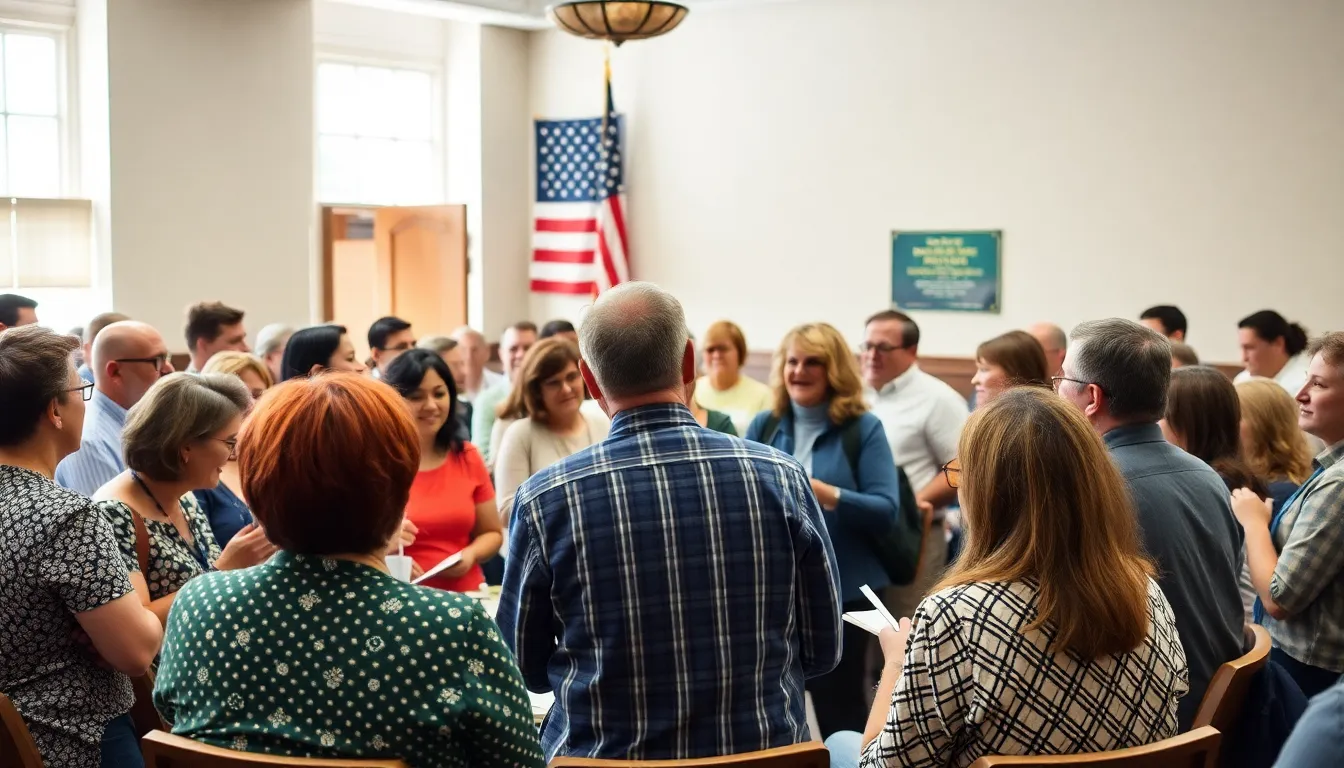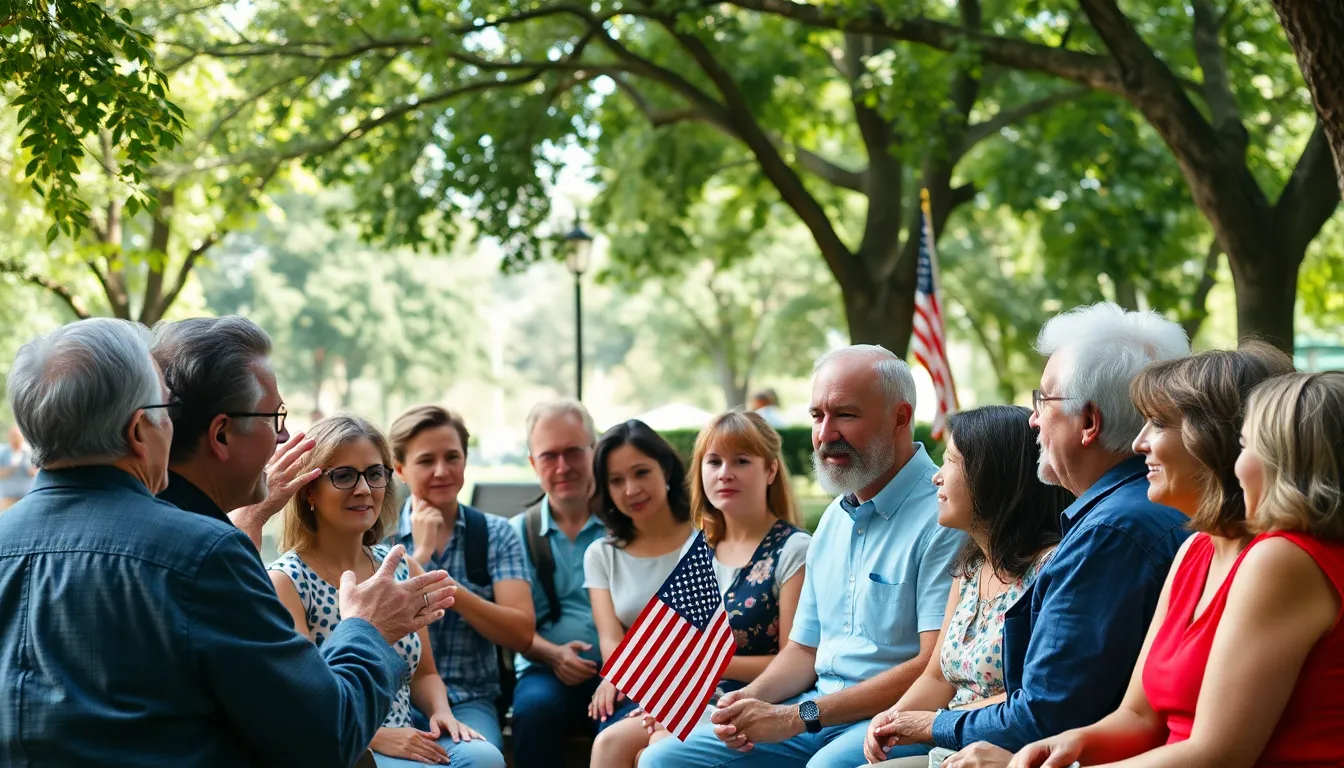Table of Contents
TogglePolitical culture shapes how societies think, behave, and interact with their governments. It’s the invisible thread weaving through the fabric of a nation, influencing everything from voting habits to civic engagement. Ever wondered why some folks enthusiastically debate policies over coffee while others can’t be bothered? That’s political culture at play, folks!
Understanding Political Culture
Political culture encompasses the shared beliefs, values, and norms that shape the political behavior of a society. It encompasses elements such as attitudes towards authority, civic responsibilities, and the organization of government.
Definition and Components
Political culture typically includes components like political socialization, which refers to how individuals acquire their political beliefs. Core values such as democracy and individual rights also play a crucial role. Symbols, traditions, and rituals often reflect a society’s political culture. Additionally, these components influence public opinion and the relationship between citizens and their government, leading to diverse political behaviors across different populations.
Importance of Political Culture
Political culture significantly impacts democratic functioning and stability. It fosters civic engagement, which enhances participation in political processes such as elections and public discussions. Understanding political culture is vital for policymakers as it aids in shaping effective governance that resonates with the populace. Moreover, political culture contributes to identity formation within communities, influencing how individuals align with political movements or parties. Differing political cultures across regions can lead to varying voting patterns and levels of political activism.
Types of Political Culture

Political culture can be categorized into three distinct types: civic culture, subject political culture, and parochial political culture. Each type reflects unique relationships between citizens and their governments.
Civic Culture
Civic culture emphasizes active participation and engagement in political processes. Individuals in a civic culture demonstrate a strong sense of responsibility and awareness of civic duties. They often engage in voting, community organizing, and public discourse. Trust in government institutions is vital, as it fosters collaboration between citizens and officials. Countries like the United States and the United Kingdom exemplify civic culture through high levels of civic engagement and democratic participation.
Subject Political Culture
Subject political culture exists where citizens are more passive and view themselves as subjects rather than active participants. Individuals in this culture often accept government decisions without question. Political awareness may be low, leading to minimal civic participation. Citizens in such cultures may prioritize compliance over engagement. Countries with authoritarian regimes often reflect this culture, where citizens remain hopeful for better governance but feel powerless to influence political change.
Parochial Political Culture
Parochial political culture is characterized by limited political awareness among citizens. Individuals in this culture focus primarily on local issues and may show little interest in broader political matters. Connections to government are often minimal, and citizens may rely on informal networks for information. Such cultures commonly exist in rural or isolated communities, where local customs and traditions heavily influence political behavior. Understanding this culture sheds light on why some individuals may not engage in national political activities.
Factors Influencing Political Culture
Political culture stems from various factors that shape collective attitudes and behaviors towards governance. Understanding these influences helps elucidate how societal values develop and evolve.
Historical Context
Historical events significantly shape political culture. Centuries of conflict, revolution, or peaceful transitions impact societal beliefs regarding authority and governance. For instance, the founding of democratic institutions often instills values of equality and justice. Nations such as France experienced waves of revolution that encouraged civic activism and a sense of national identity. On the other hand, countries with a history of authoritarian rule may manifest a culture of compliance. Historical milestones not only inform citizens’ views on government legitimacy but also dictate their level of participation in political processes.
Social Structures
Social structures, including class, ethnicity, and religion, play vital roles in forming political culture. Differing access to resources and power influences civic engagement levels across various demographic groups. Consequently, marginalized communities may exhibit distinct political attitudes shaped by experiences of exclusion. For instance, urban populations often participate more actively in political discourse compared to rural populations. Additionally, kinship ties and local networks can strengthen civic engagement within specific groups, fostering a sense of collective responsibility. Therefore, examining these social dynamics helps clarify why some groups are more politically active than others.
Media Influence
Media serves as a critical conduit for shaping political culture. News outlets, social media platforms, and entertainment programming disseminate information that influences public opinion and civic engagement. Various forms of media can either promote informed citizenship or propagate misinformation, which significantly impacts political behavior. In democratic societies, access to diverse viewpoints encourages debate and deliberation. Conversely, in less open environments, state-controlled media may reinforce existing power structures and limit public discourse. Media literacy becomes essential for individuals to navigate and analyze information effectively, enhancing their ability to engage with political issues.
Political Culture and Governance
Political culture plays a crucial role in shaping governance and policymaking within societies. Understanding this relationship reveals how shared beliefs and values influence government actions.
Impact on Policy Making
Political culture significantly impacts policymaking processes. Policymakers craft laws that reflect public sentiment, aligning with the dominant values of their constituents. For example, in societies where civic engagement is high, citizen participation leads to more responsive policies. In contrast, regions with parochial political culture may see less citizen involvement, resulting in policies that overlook broader societal needs. Additionally, historical context can guide policy decisions, shaping responses to public demand. Effective governance often relies on recognizing these cultural influences in order to tailor policies that resonate with the community.
Relationship with Democracy
Democratic systems thrive on active political culture. Engaged citizens foster accountability, increasing trust in government. A strong civic culture encourages political participation, allowing diverse voices to contribute to governance. In democracies, an informed electorate holds leaders accountable which shapes policy outcomes. Citizens often mobilize around democratic values, pushing for reforms that reflect their beliefs. Conversely, a weak political culture may limit participation and weaken democratic structures. Understanding the dynamics between political culture and democracy emphasizes the importance of nurturing civic engagement for a healthy political environment.
Political culture plays a pivotal role in shaping how individuals interact with their governments and participate in civic life. By understanding the various types of political culture and the factors that influence them, societies can better appreciate the complexities of political engagement. The dynamics between civic responsibility and government responsiveness are crucial for fostering a healthy democracy. As political cultures evolve, so too will the patterns of participation and activism. Recognizing these changes can empower citizens and policymakers alike to create a more engaged and informed electorate, ultimately leading to stronger democratic institutions.




